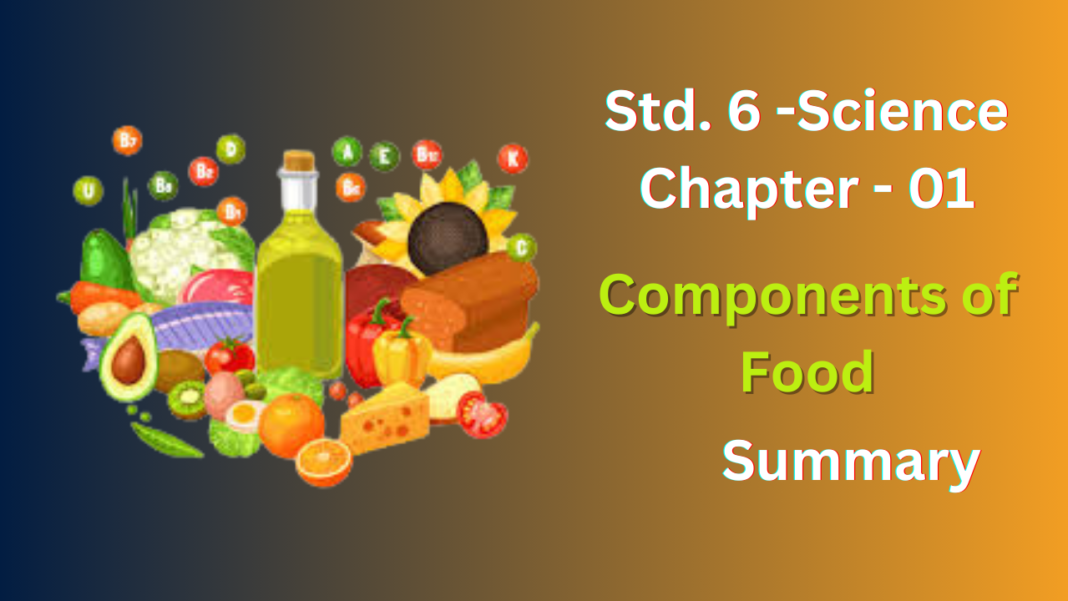NCERT Solutions for Class 6 Science Chapter 1
The chapter “Components of Food” enlightens students about the fundamental elements present in the sustenance we consume. These elements, known as nutrients, play a pivotal role in fostering the growth, restoration, and operation of our bodies. Let’s delve into a synopsis NCERT Solutions for Class 6 Science Chapter 1:
Primary Nutrients:
Carbohydrates: These act as the primary fuel source for the body. They are abundant in staples such as rice, bread, potatoes, and various fruits.
Proteins: Essential for the construction and rejuvenation of bodily tissues, proteins are abundantly found in items like meat, eggs, fish, lentils, and dairy products.
Fats: While also serving as a source of energy, fats are more densely packed and contribute to insulation. They are prevalent in items like butter, oil, nuts, and seeds.
Vitamins: These micronutrients are indispensable for a range of bodily functions. Each vitamin holds distinct responsibilities; for instance, Vitamin A promotes optimal vision, whereas Vitamin D fortifies bones. They are commonly found in fruits, vegetables, dairy items, and select meats.
Minerals: Essential for myriad bodily processes including bone and tooth formation, minerals are found in abundance in sources such as milk, verdant leafy vegetables, and fruits.
Supplementary Components:
Roughage (Dietary Fiber): Facilitating digestion and maintaining gastrointestinal health, dietary fiber is abundant in fruits, vegetables, and whole grains.
Water: Constituting a substantial portion of our bodies, water is vital for a plethora of bodily functions. Adequate consumption throughout the day is imperative.
Key Takeaways:
A balanced dietary regimen encompasses an optimal blend of these nutrients to ensure holistic growth and well-being.
Deficiencies in specific nutrients can precipitate various ailments.
Incorporating a diverse array of foods from different food groups is instrumental in meeting our nutritional requirements.
Exercises
NCERT Solutions for Class 6 Science Chapter 1
- Name the major nutrients in our food.
Ans : Carbohydrates: Serve as the primary fuel source, igniting energy within our bodies.
Proteins: Act as the architects of bodily repair and construction, fortifying our tissues. Fats: Not only fuel our systems but also act as cozy insulators, safeguarding our body’s warmth.
Vitamins: Function as microscopic powerhouses, steering numerous bodily processes with their subtle presence.
Minerals: Stand as silent sentinels, crucial for an array of physiological functions, albeit in modest quantities.
2.Name the following:
(a) The nutrients which mainly give energy to our body.
(b) The nutrients that are needed for the growth and maintenance of our body.
(c) A vitamin required for maintaining good eyesight.
(d) A mineral that is required for keeping our bones healthy.
Ans : (a) Carbohydrates and fats serve as the primary energy sources fueling our bodies.
(b) Proteins stand as the essential building blocks vital for fostering and sustaining the growth and integrity of our bodies.
(c) Vitamin A emerges as a crucial nutrient indispensable for preserving optimal eyesight.
(d) Calcium, a pivotal mineral, plays a pivotal role in ensuring the robustness and vitality of our skeletal framework.
3. Name two foods each rich in:
(a) Fats
(b) Starch
(c) Dietary fibre
(d) Protein
Ans : (a) Fats:
Ghee/Butter: These are good sources of saturated fat.
Olive Oil/Sunflower Oil: These are examples of healthy, unsaturated fats.
(b) Starch:
Rice: A staple food source with high starch content.
Potatoes: Rich in starch and a good source of energy.
(c) Dietary Fibre:
Oats: A whole grain loaded with dietary fiber, promoting gut health.
Green Leafy Vegetables: Spinach, kale, and other greens are excellent sources of fiber.
(d) Protein:
Eggs: A complete protein source with all essential amino acids.
Lentils/Pulses: These plant-based sources are good options for vegetarians and vegans.
4. Tick (✔) the statements that are correct.
(a) By eating rice alone, we can fulfill nutritional requirement of our body. ( )
(b) Deficiency diseases can be prevented by eating a balanced diet. ( )
(c) Balanced diet for the body should contain a variety of food items. ( )
peten
(d) Meat alone is sufficient to provide all nutrients to the body. ( )
Ans : (a) False (X)
(b) True (✔)
(c) True (✔)
(d) False(X)
5. Fill in the blanks. Fill in the blanks.
(a) ______is caused by deficiency of Vitamin D.
(b) Deficiency of______causes a disease known as beri-beri.
(c) Deficiency of Vitamin C causes a disease known as_____
(d) Night blindness is caused due to deficiency of_____ in our food.
Ans: (a) Rickets is caused by deficiency of Vitamin D.
(b) Deficiency of Vitamin B1 causes a disease known as beriberi.
(c) Deficiency of Vitamin C causes a disease known as scurvy. (d) Night blindness is caused due to deficiency of Vitamin
FAQ’S
NCERT Solutions for Class 6 Science Chapter 1
What are the key components of food discussed in NCERT Solutions for Class 6th Science Chapter 1?
In Chapter 1 of Class 6th Science, students explore essential components of food such as carbohydrates, proteins, fats, vitamins, and minerals.
How do carbohydrates, proteins, and fats contribute to our diet according to NCERT Solutions for Class 6th Science Chapter 1?
Carbohydrates, proteins, and fats provide energy, build and repair tissues, and regulate various bodily functions, highlighting their importance in maintaining a balanced diet.
What role do vitamins and minerals play in our overall health as explained in NCERT Solutions for Class 6th Science Chapter 1?
Vitamins and minerals are essential for supporting growth, maintaining healthy organs, and strengthening the immune system, emphasizing their significance in promoting overall health and well-being.
How can understanding the components of food discussed in NCERT Solutions for Class 6th Science Chapter 1 help in making healthier dietary choices?
Understanding the components of food allows students to make informed decisions about their diet, ensuring they consume a variety of nutrients necessary for optimal health and development.
Are there any real-life examples or experiences that illustrate the importance of the components of food discussed in NCERT Solutions for Class 6th Science Chapter 1?
Students can relate to examples of balanced diets, nutritious meals, and the role of specific nutrients in supporting physical activities and maintaining overall health, reflecting the concepts explored in this chapter.









